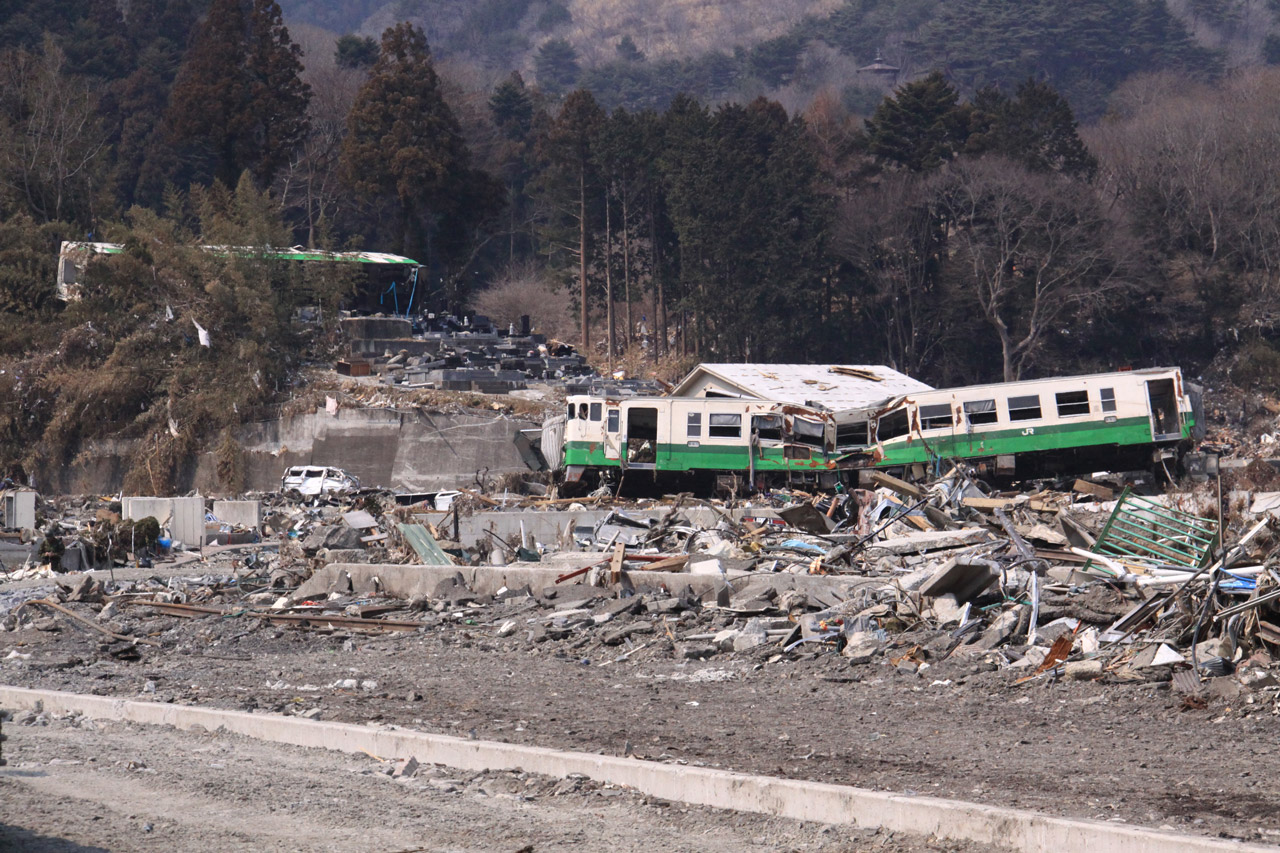Ayako Maruyama, UNV working with the UNDP Disaster Reduction Team in Asia-Pacific, shares how she experienced the 2011 Great East Japan Earthquake and how it shaped her career path.
From the Tohoku earthquake to UNDP’s tsunami preparedness frontline
March 9, 2022
Carried train at Ishinomaki Line, in Miyagi after the earthquake struck. Credits: Wikimedia Commons
As I looked out of the window, I saw the large pedestrian bridge of Fukushima rippling apart. The ground was shaking as I had never experienced before in my life. The sunny and bright sky disappeared rapidly giving place to a snowstorm that appeared from a black, dark atmosphere. It was March 11th and little did I know that I was in the middle of the most powerful earthquake ever recorded in Japan.
I had just completed nine weeks of training at the Japan International Cooperation Agency (JICA) Training Center, graduating as a JICA volunteer that very day. As I waited at the Koriyama Station, the earthquake struck stopping services such as electricity and gas and the temperature dropped sharply. I trembled. I was scared.
Afraid to go inside the building as it was dark with no power, my JICA colleagues and I took out sweaters to wear from our luggage and handed blankets to the people shivering around us. Surprisingly, many other people were taking action minutes after the shock of the earthquake. Convenience store clerks offered merchandise to people on the street for free, and bus drivers encouraged the elderly and people with small children to rest on the bus.
After the initial shock, I was stunned by the strength of Japanese infrastructure around me. The pedestrian bridge that had shook vigorously only had minor cracks, and there was not much damage to the building I was in. I learnt that in spite of such a strong earthquake, most of the country's infrastructure did not suffer. The Japanese peoples’ awareness of disaster preparedness and the resilience of built infrastructure together lessoned the impact of the earthquake. However, it is also true that many people lost their lives due to the subsequent tsunami in the coastal areas of the Tohoku region.
Students taking part in the 'Strengthening School Preparedness for Tsunamis in the Asia Pacific', a Japan-funded project to raise tsunami preparedness across Asia-Pacific. Credits: UNDP Asia-Pacific
March 11th 2011 was a significant event in my life as it determined the career path I wanted to follow. That day I realized that we must always do our best to prepare for disasters because we don't know when and where disasters can occur.
My interest in disaster resilience and preparedness grew, taking me from Japan to the Philippines as a JICA volunteer. In the Philippines I was assigned to a coastal region with several remote islands, where the damage by typhoons is one of the main causes of poverty.
I learnt that natural hazards have a serious impact on people's lives, compounding difficulties for the most vulnerable people in developing countries, especially in rural areas. Vulnerable people have limited capacity to prepare for the next disaster, regardless of how many times they experience their impact. Mutual support by people, as I witnessed on March 11th, is also important in helping reduce damage and loss. It is a manifestation of Japan’s unique disaster prevention ability cultivated through the experience of coping with multiple disasters, in the last century.
I realized that sharing experience and knowledge can help save lives. Japan’s commitment to share knowledge, in order to improve disaster prevention capabilities of developing countries, has become a key motivation for me to work in disaster risk management.
In 2011, I started to manage and coordinate the multi-country UNDP and Japan partnership project: 'Strengthening School Preparedness for Tsunamis in the Asia Pacific'. Since 2017, the 'Tsunami Project' has trained more than 150,000 students, teachers and school administrators in tsunami preparedness by developing plans and running drills in 23 countries.
Children in Thailand participated in tsunami drills, while the COVID-19 pandemic was registering its first cases in the country. Credits: Dany Oliveira, UNDP
The project is committed to raising awareness of governments and communities, institutionalizing and scaling up school preparedness and enhancing multi-hazard and community preparedness, including pandemic preparedness, especially in its current third phase. I feel the challenge and the excitement of helping so many others learn from Japan’s experience which I know first-hand.
Today marks eleven years since the Great East Japan Earthquake. Eleven years since my life changed. One of the Japanese proverbs says: "Natural disasters occur when you least expect them." I always keep this at the back of my mind, so that the memory of March 11 does not fade over time.
__
Blog by Ayako Maruyama, Disaster Risk Management Officer (UNV), UNDP Asia-Pacific

 Locations
Locations




